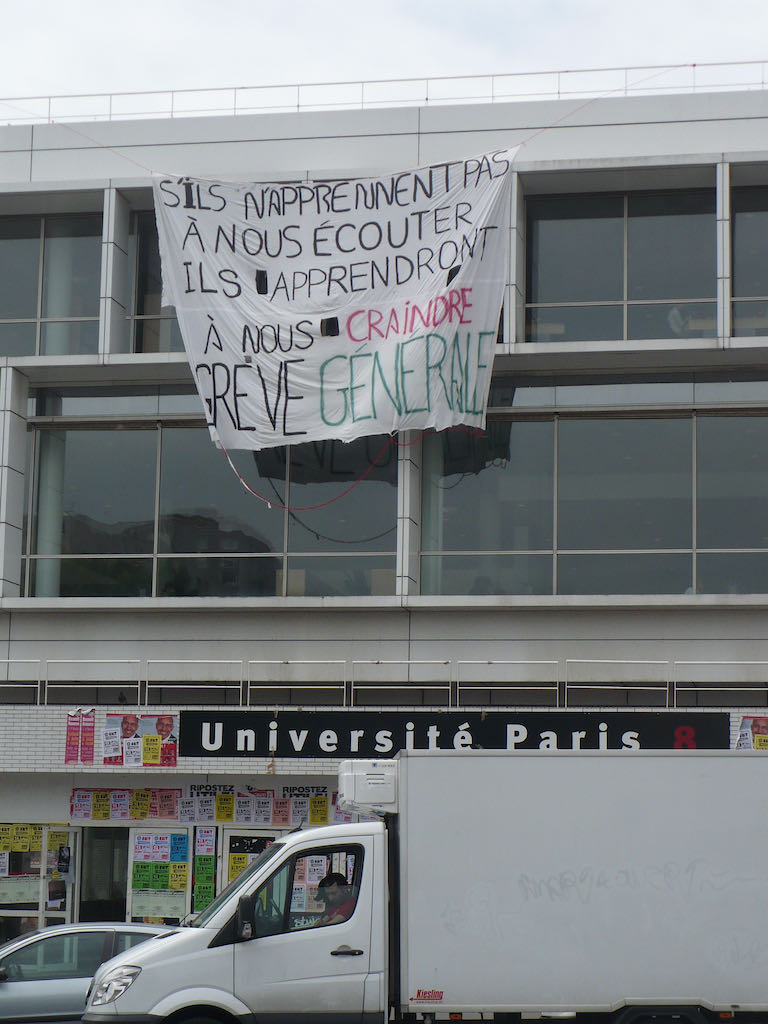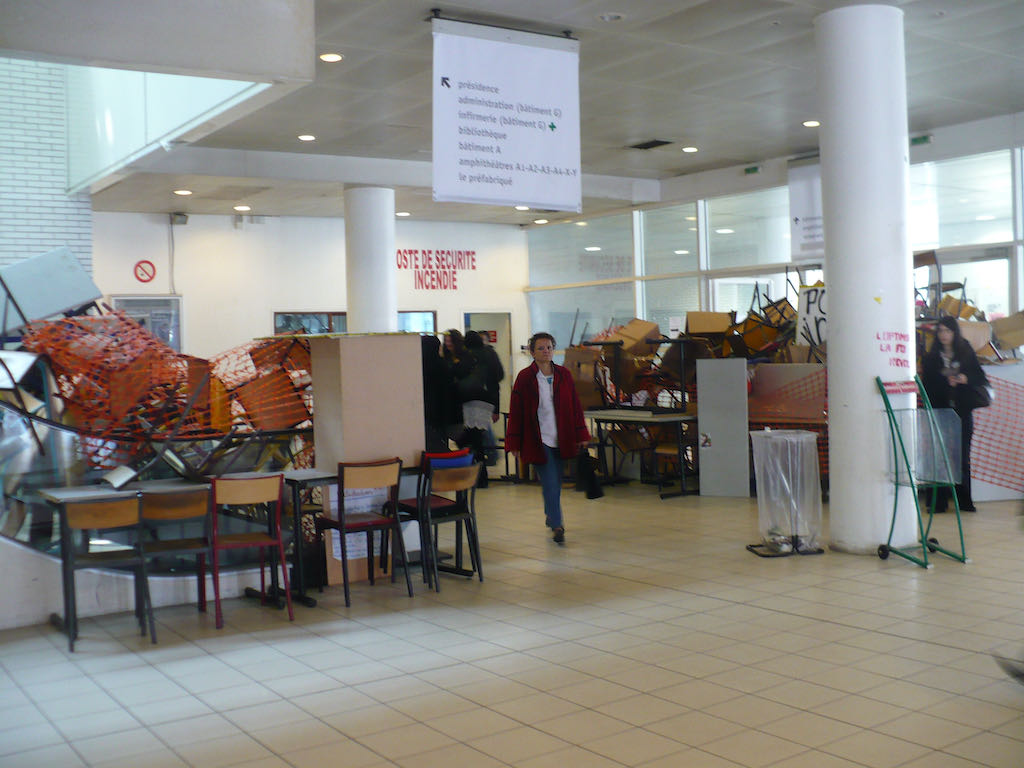
A huge banner hung from the university library when I arrived on June 11, 2009, declaring a GENERAL STRIKE. Beneath the banner was a decrepit entry hall, wallpapered with flyers and graffiti. “Long live the armed struggle.” “Universities in struggle.” “The fight goes on.” “Optimism is the faith of revolutions.” “Staff, Students, Teachers: Same Combat!: Abolition of the Law on Ruining Universities.” Hand-drawn calendars promised “alternative seminars” and activist meetings. One poster told the campus security guards to quit their jobs; another reprinted Article 35 of the 1793 Declaration of the Rights of Man and Citizen, which authorizes popular insurrection. The escalator leading farther into campus was flanked by mountains of piled chairs, one of the only barricades I ever saw in France.

Yet the barricade lay undefended and the campus was quiet, because the movement had all but given up. “The fight is not over,” said one flyer. “June 13 promises unfortunately to be the last big encounter of the year. Yet we’re coming out of several months full of all kinds of struggles.” The unsigned authors cited not only the university protest movement, which had begun on February 2, 2009, but also a NATO protest in Strasbourg, a general strike in Guadeloupe (Bonilla 2010), a strike against a factory closure in Lagny-le-sec, and several mass street marches. The declaration that the fight “is not over” was debatable, but it showed how hard it was for the protesters to quit their movement, even though the sense of loss was palpable.
The movement of that year had lasted four months, making it the longest university strike in the history of France. At stake was a university reform put in place by the right-wing Sarkozy administration’s Minister of Higher Education and Research, Valérie Pécresse. The Pécresse reforms had begun soon after Sarkozy took office in May 2007, and they constituted one of his major political priorities. They centered above all on implanting business values, corporate structures, and a spirit of “autonomy” within the traditionally statist, centralized French public university system. The usual paradox of authoritarian neoliberalism was on display in the Sarkozy reforms, as critics commonly pointed out. Entrepreneurial and market-oriented logics were not destined to emerge by themselves; tacitly, they had to be instituted from above (Vinokur 2008, Rose 2019). “Modernization,” said the avatars of reform, including many university presidents. “Ruin of public services,” said its plentiful opponents.
The reforms were rolled out in stages. They elicited an initial wave of protest in Autumn 2007. But these early protests, largely led by students, collapsed when the dominant national student union, UNEF (the National Union of French Students), made a deal with the government. They received assurances that the major student issues — low national tuition and open admissions — would remain, for the time being, untouched by the reforms. Critics of the law were not silenced, however, and unrest continued throughout the next year. The February 2009 strike was led largely by university professors, who were angry, above all, at a proposed reform of their work obligations. Teaching loads had been set (since 1984) at 128 hours of teaching per year, but Pécresse had introduced a provision that could have increased teaching loads for academics with lower research outputs. A second controversial initiative, termed mastérisation, aimed to merge teacher training into academic master’s degree programs. Behind these specific debates loomed a deeper conflict over the neoliberalization of French public services. Sarkozy’s administration aimed to make French universities more “autonomous,” aligning them with a fantasized “American model” of higher education. The traditional structures of civil service employment and centralized governance were reshaped; universities were increasingly asked to find their own resources, own their own real estate, negotiate with the State for contractualized public funds, and compete for prestige in global university rankings (Wright and Orberg 2008).
The Philosophy Department, and Paris 8 in general, was at the forefront of the 2009 protest movement. Its young president, Pascal Binczak, was a vocal opponent of the Ministry, at much political risk to himself and to his university. He was often seen marching at the front of Paris street protests. The Infinite Rounds of the Stubborn, a circular march in central Paris which became one of the best-known symbols of the movement, was organized in the Arts Division, and the philosopher Eric Lecerf was one of its major organizers. In this larger context, the Philosophy Department undertook an initiative to write a utopian Declaration of Independence.
This text, in all its utopian ardor, can only be understood as an exception to an exception, a reaction to a reaction. The strike itself was already a moment of political exception to the everyday academic life. Yet an instrumental rationality often governs French social movements, which focus on pressuring the French state to alter its policies or regulations. French activists typically focus on realpolitik questions about goals, demands, strategies, and the balance of power. Utopian representations such as the University Declaration of Independence, however, break with this practical politics to produce purified wish-images organized around unblemished ideals. The writing of the Declaration thus constituted a utopian exception to the ritualized exception of French protest.
This second exception was an answer to some structural problems with the strike itself. The strike was largely empty time: classes were suspended; entrances to campus were blocked; everyday campus life was halted. This empty time needed, in some way, to be filled. And it turned out that not everyone liked doing the usual, instrumental strike activities. Activists were at ease with political organizing, with its rhythms of pamphlet-writing, strategizing, networking, spreading information, deliberating, and marching. Some of their colleagues, though, preferred simply to stay home during the strike, rather than participating in the strike activities.
Out of frustration with the conventional protest forms, many alternative strike activities were invented, from street theatre to courses taught in the metro. The project of writing a Declaration of Independence was but one of these. It was particularly adapted to philosophers’ skills: it was a rare occasion to write in a grand philosophical register, sidestepping the pressure to parse all the intricate policy details of the university reforms themselves. And it took advantage of the rare sense of time that the strike afforded. During regular teaching semesters, everyone was busy, often even overwhelmed. I never saw a regular teaching semester that produced a Declaration.
Thus if the strike was an exception to university time, then the declaration was an exception in the instrumental time of the strike itself. There is a logic here: the logic of making holes in the temporal order. But this was not a logic of individual agency: no single actor could change the flow of collective time. To create an exception to the normative flow of time, it took collective energy and investment.